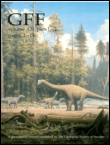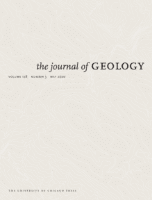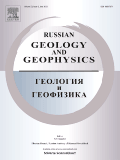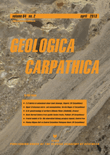
GFF
Scope & Guideline
Innovative Discoveries in Geology and Paleontology Await.
Introduction
Aims and Scopes
- Stratigraphy and Sedimentology:
GFF publishes research on stratigraphic units, age assessments, and sedimentary processes, providing insights into geological timelines and sedimentary environments. - Paleontology and Biostratigraphy:
The journal features studies on fossil records, including the diversity and evolution of ancient organisms, and their applications in biostratigraphy to date geological formations. - Geochemistry and Geochronology:
Research on isotopic and elemental analyses is prominent, offering critical data to understand the provenance and age of geological samples. - Geological Mapping and Geomorphology:
GFF includes studies on geological mapping, landforms, and processes that shape the Earth's surface, particularly in the Nordic countries. - Mineralogy and Petrology:
The journal explores mineral compositions and rock types, emphasizing their formation processes and implications for regional geology. - Tectonics and Structural Geology:
GFF publishes works on tectonic movements and structures, contributing to the understanding of regional geological stability and change.
Trending and Emerging
- High-Resolution Chemostratigraphy:
Recent studies emphasize detailed carbon isotope analyses and chemostratigraphy, enhancing the understanding of temporal changes in sedimentary environments. - Regional Geology of the Baltic Region:
There is a notable increase in research focusing on the geological features of the Baltic Sea and surrounding areas, signifying a trend toward regional specificity in geological studies. - Advancements in Geochronology Techniques:
Emerging methodologies in geochronology, particularly U-Pb dating, are being extensively applied, indicating an ongoing refinement of age-dating techniques in geology. - Fossil Diversity and Evolutionary Studies:
A growing focus on the diversity and evolutionary history of ancient organisms, particularly from the Ordovician and Cambrian periods, reflects an expanding interest in paleobiology. - Geochemical Indicators in Paleoenvironmental Reconstruction:
The application of geochemical analyses to infer past environmental conditions is gaining traction, highlighting the importance of chemical signatures in understanding geological history.
Declining or Waning
- Paleoclimatology:
Research on ancient climate reconstructions has become less frequent, possibly due to a shift towards more localized geological studies and a focus on stratigraphy. - Marine Geology:
While marine geology was previously a significant area of study, the number of papers addressing marine sedimentation and processes has decreased, indicating a narrowing of focus towards terrestrial geological features. - Historical Geology:
There appears to be a reduction in the exploration of historical geological events and their broader implications, as the journal increasingly emphasizes current stratigraphic and paleontological studies.
Similar Journals

STRATIGRAPHY AND GEOLOGICAL CORRELATION
Charting the Course of Geological DiscoverySTRATIGRAPHY AND GEOLOGICAL CORRELATION is a prominent scholarly journal published by PLEIADES PUBLISHING INC, featuring a dedicated focus on the fields of geology, stratigraphy, and paleontology. With ISSN 0869-5938 and E-ISSN 1555-6263, this journal has been disseminating significant research findings since its inception in 1994, continuously contributing to the academic discourse through 2024. Despite not currently offering open access, its relevance is underscored by its Category Quartiles for 2023, where it has established itself as Q3 in Geology and Paleontology, and Q2 in Stratigraphy. STRATIGRAPHY AND GEOLOGICAL CORRELATION ranks #29 out of 55 in Stratigraphy and #186 out of 321 in Geology according to Scopus metrics, positioning it within the competitive landscape of Earth and Planetary Sciences. Researchers, professionals, and students are invited to engage with the journal’s content to deepen their understanding and foster innovation within these critical areas of study.

Turkiye Jeoloji Bulteni-Geological Bulletin of Turkey
Pioneering insights in geology for researchers and practitioners.Turkiye Jeoloji Bulteni-Geological Bulletin of Turkey (ISSN: 1016-9164) is a prominent scholarly journal published by the TMMOB JEOLOJI MUHENDISLERI ODASI in Türkiye, dedicated to advancing the field of geology through high-quality research and dissemination of significant scientific findings. With an emphasis on geological studies pertinent to the region and its global implications, the journal serves as a crucial platform for researchers, professionals, and students aiming to share and explore innovative theories, methodologies, and case studies. Although the journal operates under a traditional access model, its rich content provides valuable insights into varied topics including but not limited to mineralogy, geophysics, petrology, and environmental geology. Furthermore, the journal's commitment to exhibiting originality and relevance ensures its vital role in shaping geological research, fostering collaboration among academics and practitioners alike.

JOURNAL OF GEOLOGY
Charting New Territories in Geological Research.The JOURNAL OF GEOLOGY, published by University of Chicago Press, serves as a premier platform for disseminating groundbreaking research in the field of geology. Established in 1973, this esteemed journal has consistently ranked in the Q2 category in geology, further solidified by its Scopus ranking, where it is positioned at 99 out of 321 in Earth and Planetary Sciences, marking it in the 69th percentile of its category. With an emphasis on innovative and interdisciplinary studies, the journal features peer-reviewed articles that contribute to the understanding of geological processes, earth materials, and environmental interactions. Although it does not currently offer open access, it facilitates broad access through academic institutions to reach a global audience of researchers, professionals, and students striving to advance the knowledge of Earth's history and dynamics. As a vital resource for the geology community, the JOURNAL OF GEOLOGY plays an essential role in fostering scholarly dialogue and advancing both academic inquiry and practical applications in geology.

CARNETS DE GEOLOGIE
Exploring the Depths of Geological ScienceCarnets de Geologie is a prominent open-access journal dedicated to the dynamic fields of geology, paleontology, and stratigraphy. Published by Carnets Geologie and based in France, the journal has been a platform for scholarly communication since 2002, facilitating unrestricted access to high-quality research. With a robust impact reflected in its 2023 quartile rankings—Q2 in Geology, Paleontology, and Stratigraphy—Carnets de Geologie ranks favorably within Scopus, positioning itself at the 60th percentile for Earth and Planetary Sciences. The journal aims to disseminate innovative research findings and foster academic discourse among researchers, professionals, and students interested in the intricate aspects of Earth's history and processes. Encompassing a broad scope that reflects continuous developments in the geological sciences, Carnets de Geologie is dedicated to advancing knowledge and understanding within its community.

Swiss Journal of Geosciences
Unlocking the Secrets of Our Planet, One Article at a TimeSwiss Journal of Geosciences is a prestigious academic journal dedicated to advancing the field of geosciences, published by SPRINGER INTERNATIONAL PUBLISHING AG. Since its inception in 2007, the journal has established itself as a leading platform for disseminating high-quality research findings in various domains related to Earth and planetary sciences, achieving a notable Q1 ranking in Geology as of 2023. With a solid reputation reflected in its Scopus ranking of Rank #72/321, the journal stands in the 77th percentile within its category. Based in Switzerland, the Swiss Journal of Geosciences embraces an open access model, making it easier for researchers, professionals, and students worldwide to access vital geological research without barriers. The journal’s objectives include promoting interdisciplinary research and fostering insights that address both fundamental and applied geoscientific problems, ensuring it remains a crucial resource for those seeking to understand our planet’s dynamics. Engage with pioneering research and contribute to the vibrant community of geoscientists by exploring the impactful articles published within its pages.

JOURNAL OF IBERIAN GEOLOGY
Pioneering research in the realm of Iberian geology.JOURNAL OF IBERIAN GEOLOGY, published by Springer International Publishing AG, is a pivotal platform dedicated to advancing the field of geology and stratigraphy. With an ISSN of 1698-6180 and E-ISSN of 1886-7995, this journal has earned its reputation in the academic community, holding a commendable Q2 ranking in both Geology and Stratigraphy for 2023, reflecting its contributions to contemporary geological research. Spanning from 2007 to 2024, it provides a comprehensive forum for scholars and practitioners from around the globe to disseminate their findings pertaining to the Iberian Peninsula, enhancing the understanding of regional geological phenomena. The journal has carved out a significant niche within the Earth and Planetary Sciences, ranking #137 out of 321 in Geology and #24 out of 55 in Stratigraphy, indicating its wide-reaching impact and scholarly engagement. The Journal of Iberian Geology serves as an indispensable resource for those interested in the complexities of geological structures, stratigraphic sequences, and the broader implications of geological research, making it a vital reference for researchers, professionals, and students alike.

Russian Geology and Geophysics
Elevating Research Standards in Geology and GeophysicsRussian Geology and Geophysics is a seminal journal published by GEOSCIENCEWORLD that plays a pivotal role in the dissemination of vital research within the realms of Earth-Surface Processes, Geology, and Geophysics. With an ISSN of 1068-7971 and an E-ISSN of 1878-030X, this journal has witnessed a continuous evolution since its convergence in 2007 and is poised to thrive through 2024. While it is not an Open Access journal, it is recognized for its significant contributions to the academic community, holding a respectable Q2 ranking in Earth-Surface Processes and Q3 rankings in both Geology and Geophysics as of 2023. The journal’s impact factors align it within competitive quartiles, marking it as an essential resource for researchers and professionals seeking to stay at the forefront of geological and geophysical sciences. By publishing high-quality peer-reviewed articles, the journal fosters an environment of knowledge sharing and innovation, making it indispensable for students, practitioners, and scholars alike who are dedicated to advancing our understanding of Earth's complex systems.

GEOLOGICA CARPATHICA
Pioneering Research in Earth and Planetary SciencesGEOLOGICA CARPATHICA, with ISSN 1335-0552 and E-ISSN 1336-8052, is a distinguished open access journal published by the Slovak Academy of Sciences Geological Institute, serving as a pivotal platform for the dissemination of research in the field of Geology. Established in 1991 and continuing through 2024, the journal is recognized for its significant contributions to Earth and Planetary Sciences, evidenced by its 2023 Scopus ranking placing it in the second quartile (Q2) within Geology. With an H-index that showcases its impactful publications, GEOLOGICA CARPATHICA is committed to fostering scholarly communication while promoting accessible research, having adopted an open access model since 2009. Located in beautiful Bratislava, Slovakia, this journal aims to engage a global audience of researchers, professionals, and students interested in ecological, geological, and environmental studies, making it a prominent resource for enriching the scientific community's understanding of the Carpathian region and beyond.

Russian Journal of Pacific Geology
Fostering Innovation in Earth and Planetary SciencesThe Russian Journal of Pacific Geology is a pivotal resource in the realm of Earth sciences, published by PLEIADES PUBLISHING INC. With an ISSN of 1819-7140 and an E-ISSN of 1819-7159, this journal has established itself as a significant publication for researchers, professionals, and students who explore the intricate geology of the Pacific region. Covering a wide array of topics including Geochemistry, Petrology, Geology, Geophysics, Oceanography, Paleontology, and Stratigraphy, the journal's relevance is underscored by its categorization within Q3 quartile rankings across multiple disciplines in the 2023 metrics. Operating from the United States, its influential publications span from 2007 to 2024, attracting a diverse audience dedicated to advancing the geological sciences. Although not an open access journal, it serves as a valuable repository of knowledge, presenting original research, reviews, and critical discussions that enhance scholarly discourse. The journal is recognized within the global scientific community, addressing significant geological challenges while fostering collaboration and innovation among scholars in the Earth and Planetary Sciences.

Austrian Journal of Earth Sciences
Unveiling Earth's Secrets Through ResearchThe Austrian Journal of Earth Sciences, published by SCIENDO, is an esteemed open-access journal specializing in the disciplines of geology, paleontology, and stratigraphy. With an ISSN of 2072-7151, this journal has established itself as a significant platform for innovative research and scholarly communication in the earth sciences. Since its inception in 2007, it has continuously expanded its influence, achieving notable rankings in the Scopus database—#113 in Geology, #42 in Paleontology, and #21 in Stratigraphy, demonstrating its commitment to high-quality publications. The journal holds prestigious quartile rankings of Q1 in both Geology and Paleontology and Q2 in Stratigraphy as of 2023, reflecting its impact and relevance in the scientific community. Researchers and students alike are encouraged to explore and contribute to the evolving discourse within this dynamic field, as the Austrian Journal of Earth Sciences fosters collaboration and knowledge sharing across global platforms.